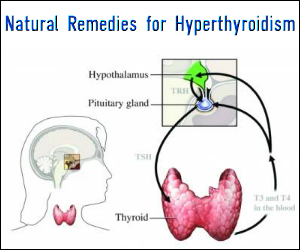Natural Remedies for Hyperthyroidism
 Hyperthyroidism or overactive thyroid is a problem where the thyroid gland creates extreme amounts of thyroid hormone. In this post we will discuss some best natural remedies for hyperthyroidism. As the thyroid gland secretes extreme amounts of the hormones thyroxine and triiodothyronine, a lump may develop at the base of the throat. This swelling, called a goiter, might come to be visible to others. While hyperthyroidism could strike any person, the Medical Center at the University of Maryland records that it’s likely to occur in women between 20 and 40. After a preliminary medical diagnosis from your medical professional, you may attempt natural treatments to decrease the signs of hyperthyroidism.
Hyperthyroidism or overactive thyroid is a problem where the thyroid gland creates extreme amounts of thyroid hormone. In this post we will discuss some best natural remedies for hyperthyroidism. As the thyroid gland secretes extreme amounts of the hormones thyroxine and triiodothyronine, a lump may develop at the base of the throat. This swelling, called a goiter, might come to be visible to others. While hyperthyroidism could strike any person, the Medical Center at the University of Maryland records that it’s likely to occur in women between 20 and 40. After a preliminary medical diagnosis from your medical professional, you may attempt natural treatments to decrease the signs of hyperthyroidism.
Symptoms of Hyperthyroidism
Hyperthyroidism has numerous signs that can differ from person to person. Some typical symptoms of hyperthyroidism are uneasiness, nervousness, problem in focusing things, exhaustion, rapid pulsation, heat intolerance, increased sweating, difficulty resting, hand trembling, weight-loss, boosted appetite, constant bowel motions, and muscle weakness. Hyperthyroidism, if left unattended, may induce heart problems, weakening of bones, eye problems and various other significant issues.
What Causes Hyperthyroidism?
The most common cause is overproduction of thyroid hormone by the entire thyroid gland and this disorder is likewise referred to as Graves’ disease. Graves’ illness is induced by antibodies in the blood that switch on the thyroid and create it to grow and secrete excessive thyroid hormone. This kind of hyperthyroidism has a tendency to run in families and it develops much more frequently in young females. Other usual causes include Thyroid nodules and Thyroiditis. You could get thyroiditis from a viral or bacterial infection besides it also develops when your body makes antibodies that ruin your thyroid gland whereas thyroid nodules are uncommon growths in the thyroid gland that can make too much thyroid hormone.
Natural Remedies for Hyperthyroidism
If you have hyperthyroidism, numerous treatment options are available. Physicians utilize anti-thyroid prescriptions and radioactive iodine to reduce the production of thyroid hormones. Overactive thyroid could be managed with the support of some dietary guidelines and modification in a way of living. Without treatment, hyperthyroidism could lead to major heart issues, bone problems, and a dangerous health condition called thyroid storm. Here are some natural remedies for hyperthyroidism:
Diet for Hyperthyroidism
 Diet is among the many natural ways of treating hyperactive thyroid. Following an overactive thyroid diet is a proven method to minimize enhanced thyroid levels and stop hyperthyroidism from intensifying. Certain foods can cause manufacturing of thyroid gland hormones as they consist of a high quantity of iodine. As a result excess of iodine in the diet regimen is expected to induce overproduction of thyroid hormone.
Diet is among the many natural ways of treating hyperactive thyroid. Following an overactive thyroid diet is a proven method to minimize enhanced thyroid levels and stop hyperthyroidism from intensifying. Certain foods can cause manufacturing of thyroid gland hormones as they consist of a high quantity of iodine. As a result excess of iodine in the diet regimen is expected to induce overproduction of thyroid hormone.
Those influenced by hyper thyroid gland should include broccoli, kale, green spinach, cauliflower, cabbage, mustard, soy, wintergreen, walnuts, turnips etc. in their diet regimen, as these things could hinder the impact of overproduction of thyroid hormone in the body. Peaches and pears are also recommended; as they help stopping over-functioning of the thyroid. Lots of green veggies, healthy protein abundant foods, limited carbs in the diet plan can help handle the problem.
A diet regimen rich in omega-3 fatty acids, vitamin C and calcium is typically recommended by nutrition experts. Keep in mind that a diet regimen that is low in carbs, fiber and iodine can reduce numerous of the high thyroid levels symptoms. Limiting the intake of nicotine, alcohol and high levels of caffeine present in tea, coffee, sodas and chocolate help decrease the symptoms of overactive thyroid as they are all responsible for enhancing the metabolic rate.
Supplements for Hyperthyroidism
Some natural supplements are useful in curing hyperthyroidism and The Mayo Clinic recommends consuming a minimum of 1,000 milligrams of calcium daily to minimize the bone reduction related to hyperthyroidism. You require at the very least 1,200 milligrams if you’re over 50. Various other useful natural supplements might consist of omega-3 fatty acids discovered in fish and fish oil, vitamin C, vitamin A and B-complex vitamins, magnesium mineral and zinc. Despite increase appetite, you could witness fat loss if you experience hyperthyroidism. Increasing your caloric consumption, particularly in the kind of protein, might aid you keep healthy and balanced muscles.
Natural Herbs for Hyperthyroidism
The University of Maryland recommends boosting your overall health with safe organic solutions. Right here is a list of some herbs that are beneficial to cure overactive thyroid.
a. Lemon Balm
Lemon balm helps control the over secretion of the thyroid hormone and The University of Maryland Medical Center suggests a consumption of 300 to 500 mg 3 times daily of the dried out herb or consuming a fresh mug of lime balm tea, 2 to 4 times daily.
b. Bugleweed
Bugleweed, likewise called Lycopus Virginica, might assist normalize an overactive thyroid. The University of Maryland Medical Center shares that a dosage of 1 to 2g could be useful for correct thyroid function, including a problem called thyroiditis, where your thyroid ends up being inflamed. You could prepare this herb by steeping 1 to 2g in 1 cup of boiling water, stressing it then letting it cool. The University of Maryland Medical Center says that this natural herb could conflict with some diabetic medications, so consult your physician prior to taking this herb.
c. Green Tea
Green tea could be of benefit in hyperthyroidism considering that of its antioxidant effect. An extract of 250 to 500 mg a day should be used without caffeine. Caffeine is an energizer and may trigger signs of hyperthyroidism. Antioxidants play an important part to secure your body from foreign elements that can trigger infection and health problem.
d. Motherwort
Motherwort can help normalize an increased heartbeat that can develop in both hyperthyroidism and other thyroid conditions, such as thyroiditis. The University of Maryland Medical Center recommends that a dosage of 2g steeping in 1 cup of boiling water, strained and cooled, might be of advantage for appropriate thyroid gland function. You can use this drink three times each day, however, The University of Maryland Medical Center states that this natural herb should not be used with sedatives. Consult your medical professional prior to taking this or any kind of various other herbal supplements.
e. Radishes
Both black and red radishes have actually been used to manage thyroid hormones. The primary chemical in radishes called raphanin is helpful keeping typical levels of thyroid hormones in both hypothyroidism and hyperthyroidism.
Exercises and Yoga for Hyperthyroid
Workout and yoga exercise are practical to ease overactive thyroid trouble. However, stay away from high-intensity workouts till you understand exactly how your body reacts to numerous kinds of physical exercises, and speak to your doctor regarding precautionary measures. Yoga poses for the thyroid concentrate on the throat and neck location. Yoga poses like cat pose, fish pose and bridge pose are helpful to manage hyperthyroid.
Aromatherapy for Hyperthyroidism
Utilizing aromatherapy products having lavender induces a sense of calm and tranquility. Aromatic candle lights and a warm bath prior to bed unwind the muscular tissues and induce sleep in a person struggling with hyperthyroidism.
Hyperthyroidism is a disorder that can significantly influence your daily life routine. If you are diagnosed with hyperthyroidism, consult with your doctor to discuss your treatment, including natural treatment options. Remain cautious when taking natural supplements to manage your hyperthyroid problem, as particular natural herbs might obstruct various other medicines you could be taking or cause undesired side effects. Assess the risks of natural remedies for hyperthyroidism with your physician before utilizing them to regulate your thyroid function.